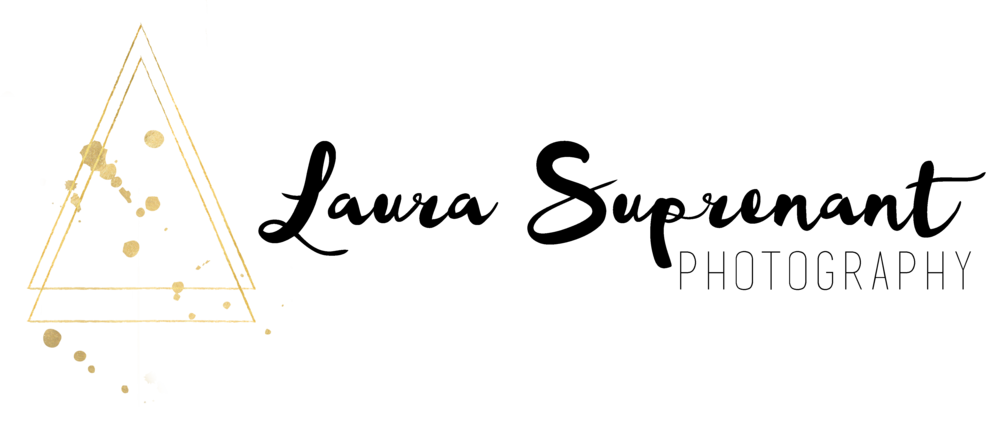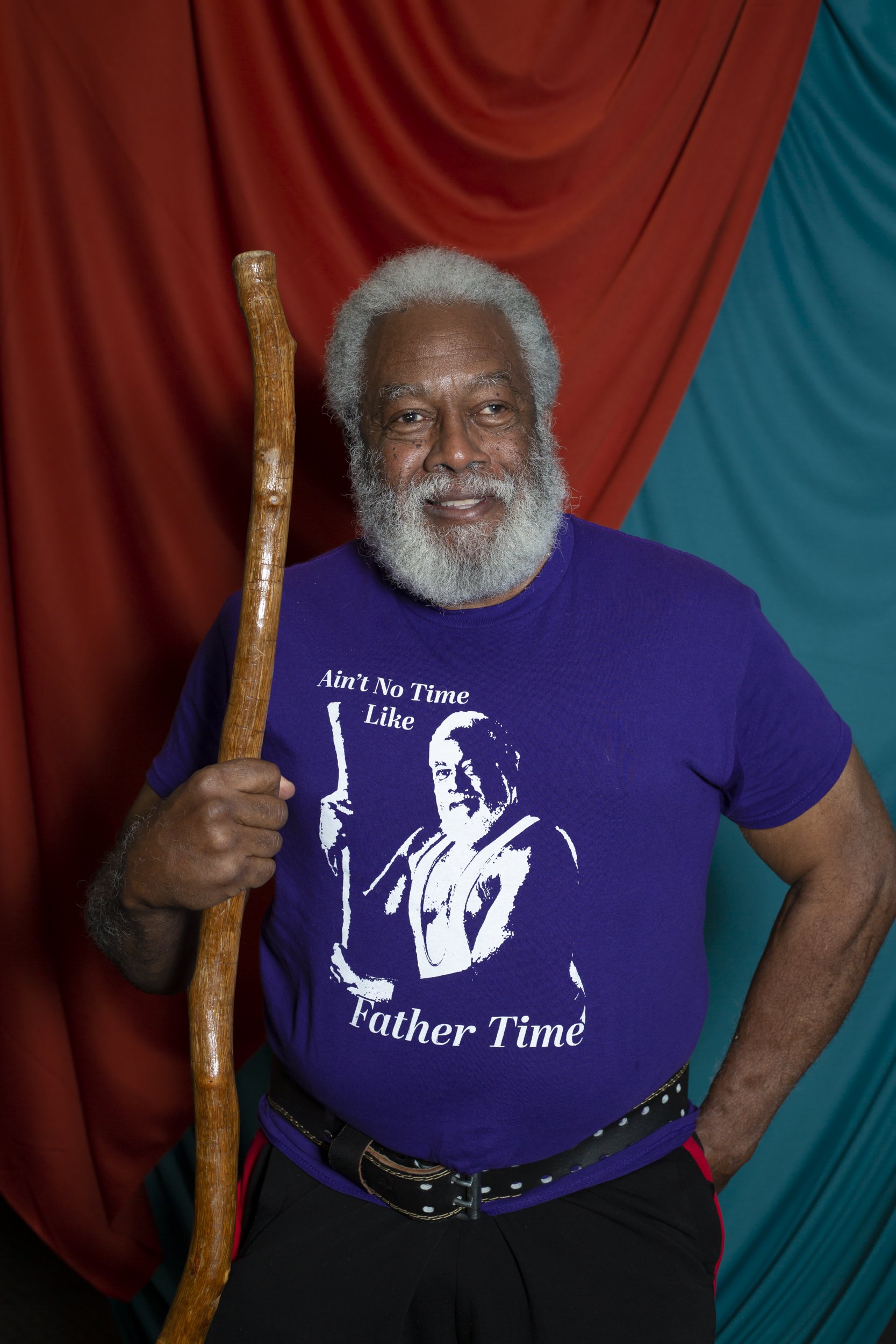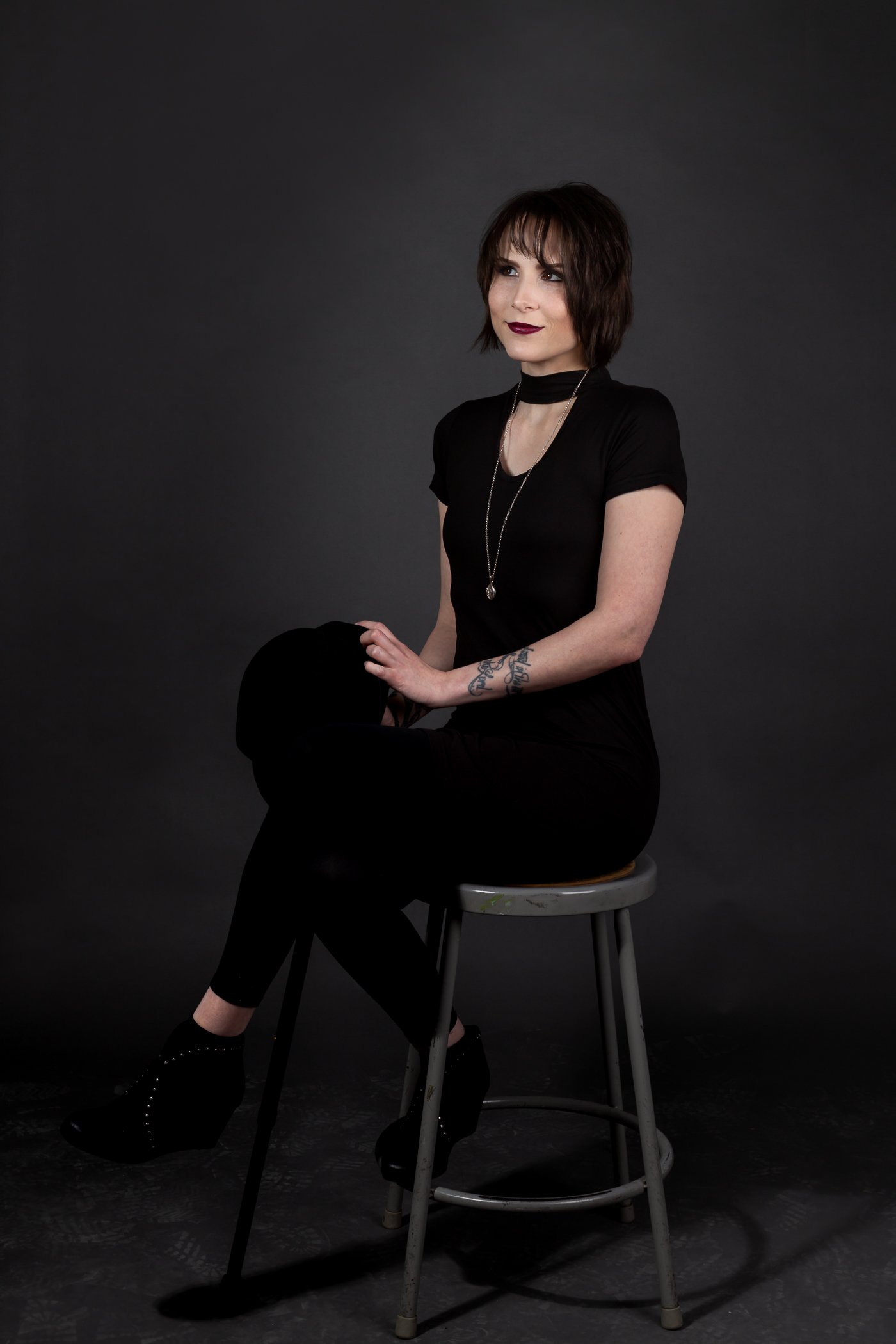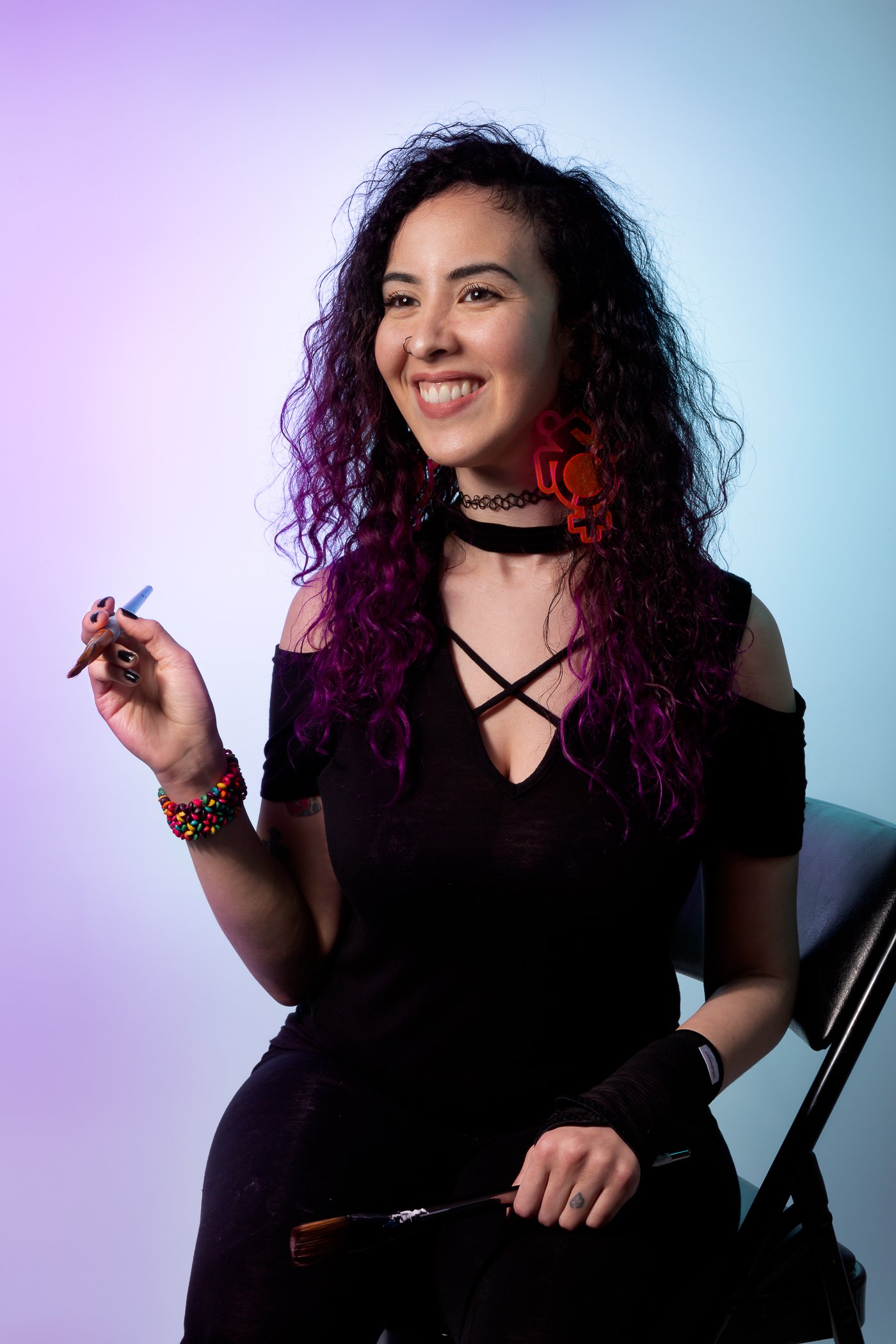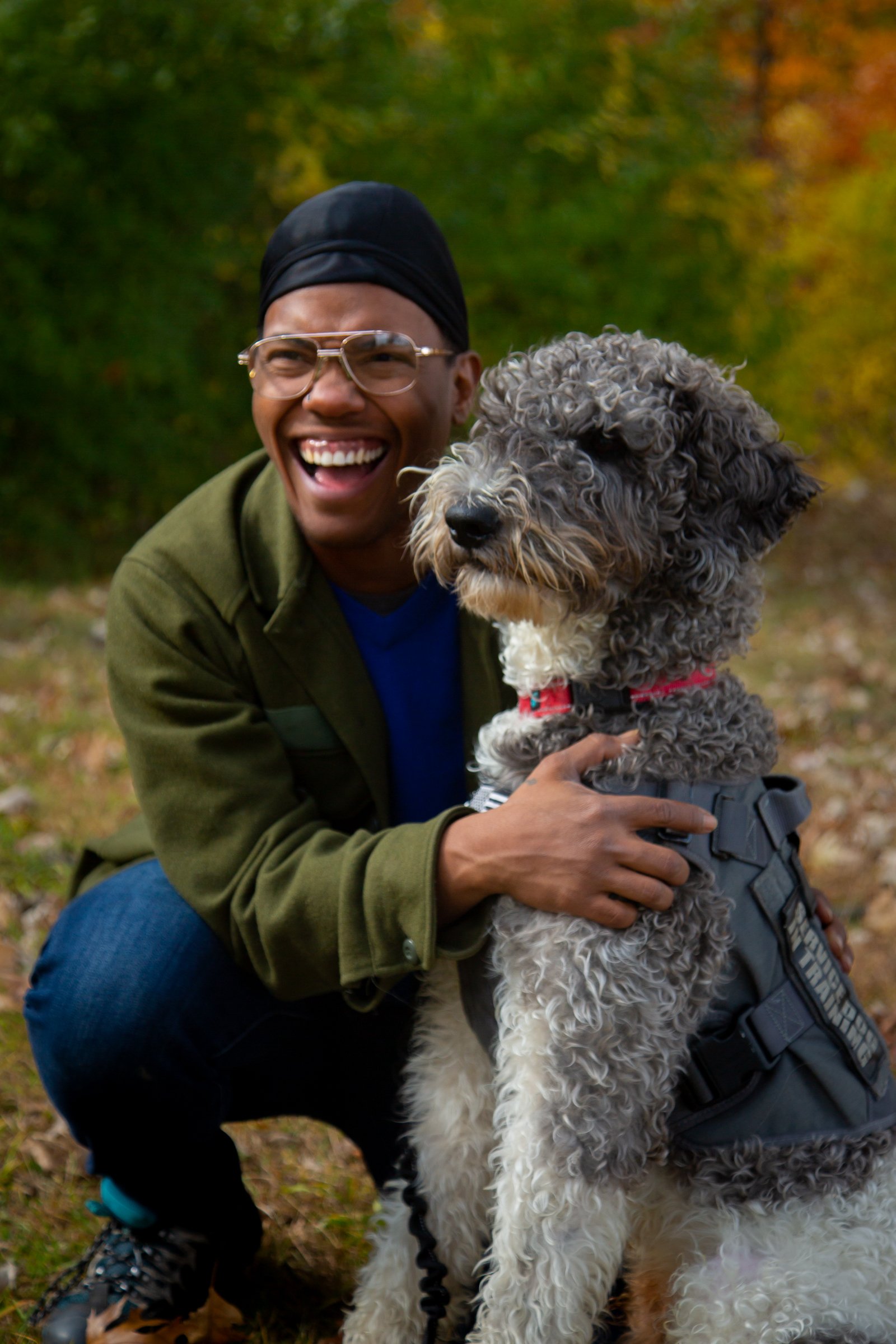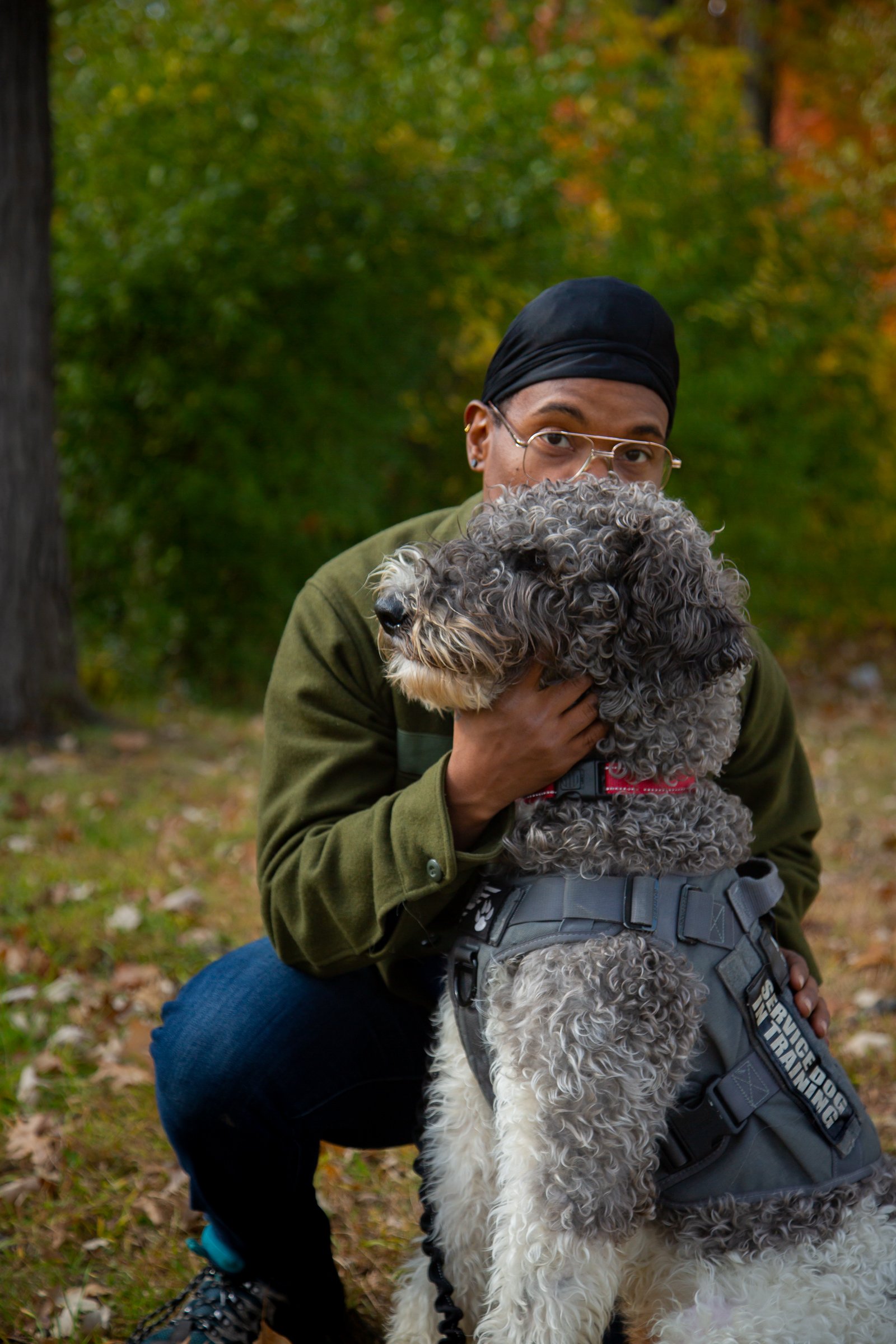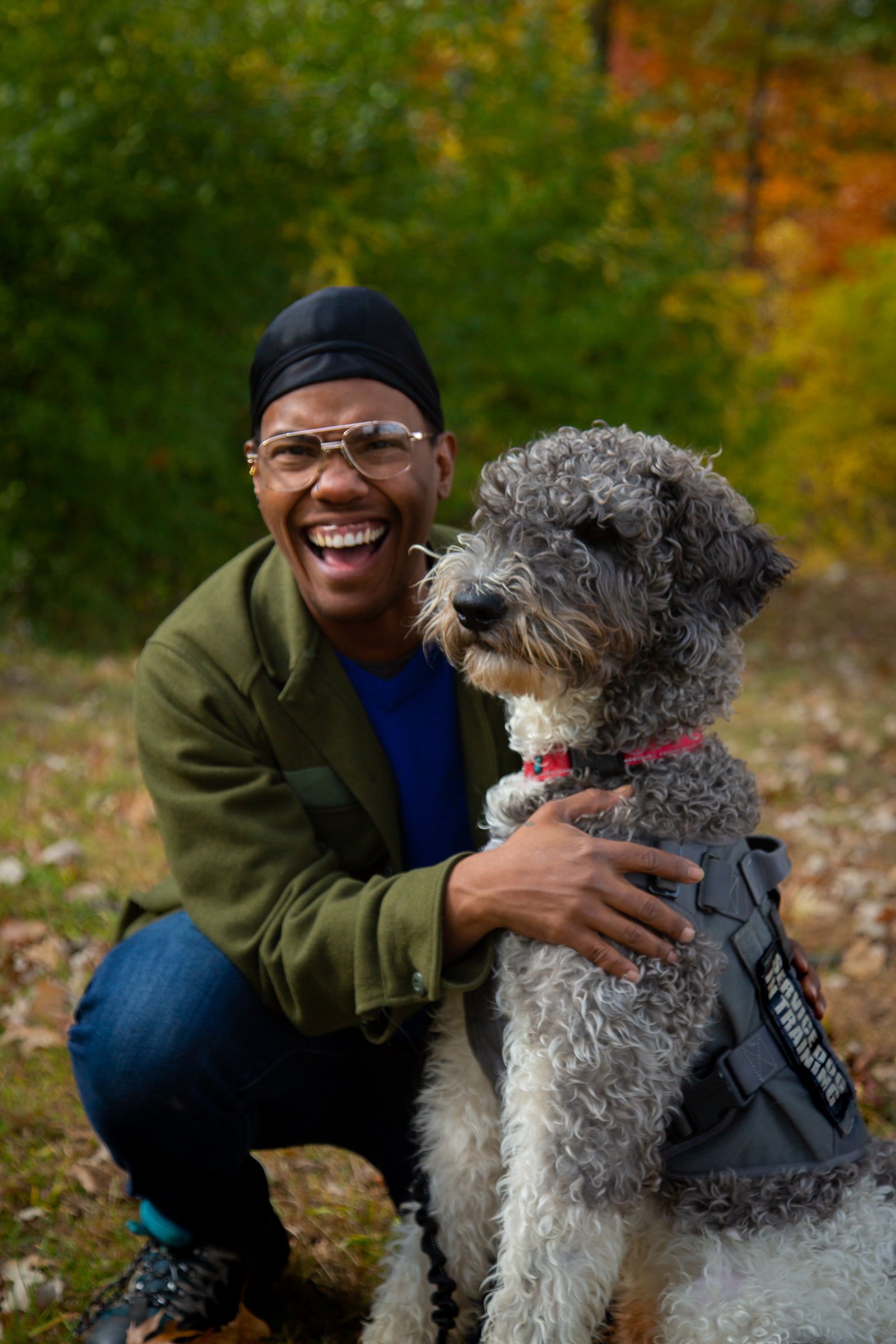Laura: First question; what is your name?
Father: Father Time.
Laura: Father Time. And what is your birth name?
Father: Napier.
Laura: How would you like to be known?
Father: Father Time.
Laura: Cool. Good to know. Um and what is your age? You can always say timeless if you want.
Father: Timeless.
Laura: Alright, so tell me, I'm sorry your, your diagnosis one more time.
Father: Retinitis pigmentosa. RP.
Laura: Does that mean then you're legally blind?
Father: Yeah, I am. I think I'm gonna be legally blind now. Yeah I have uh this side is like, um, it's, it's, why everything is whitey now. This side, I can see bright light if I kind of get the pigments right. So this was just like, I'm still here, okay?
Laura: Gotcha.
Father: Retinitis pigmentosa is a degenerating eye disease that destroys the cones, the cones and rods, and you start losing peripheral vision. So everything, so everything starts to narrow down because of the pigment that grows on the back of the eye and around the optic nerve. It also causes the optic nerve damage cause the pressure on the eye. There are some genetic treatments, but stem cells, but it depends on, which uh, which one that you have. I've got the one they’re saying ‘ii’.
Laura: Yeah the stem cells aren't going to work for it.
Father: Yeah. So, they do a genetic background. So some of them they did there are some treatments. There's been a couple of doctors down in Florida was one that treated a couple of people for RP and they wound up going blind. But he was he was more of a; ‘I'll give her a shot. I think I got my degree from Kellogg’s’.
Laura: Did you used to see more when you started wrestling?
Father: Yeah. I saw a little bit more. I was, you know, at least in a in a dark room. I could see you, but now it's like, make some noise or either hope you're sweating.
Laura: So were you born, like able to fully see?
Father: Okay. This is uh listen, I call it a generational disease but it skips generations.
Laura: Oh really?
Father: I look back and there was only one, one person that I knew that was blind. It was one of my aunties, and she was like, oh God, 90 some odd years old. So I don't know whether because of being so old or because of retinitis. I went back as far as I could and the only ever person, and it was me. And it went to my daughter normally…
Laura: Oh wow.
Father: Retinitis pigment before there was a lot of research, normally, retinitis pigmentosa go from the mother to the son. This went from the dad to the daughter. So, I think our names in the medical journal, possibly.
Laura: Probably.
Father: So I remember the first time I was diagnosed. I was probably in first grade. And uh my grandparents, he worked construction. So I was able to go to a pretty decent ophthalmologist. And uh the first time they looked at it, you know, he said; ‘Your grandson is going to go blind’. And I heard my grandmother screaming and yelling at him. She didn’t take it too well. And because of the rarity of the disease, they thought it was just in the in the Caucasians.
Laura: Oh really?
Father: But my dad is isn’t Caucasian; don’t say he is.
Laura: My lips are sealed.
Father: So anyway, so it's been a degenerating disease. It’s been gradual. And something really interesting about it; uh I was I used to, I used to think I was big and clumsy. Because sometimes I would trip over things, you know? I didn't know that uh there's lack of peripheral vision.
Laura: Oh wow.
Father: And then kind of dim light. It was hard to see. So when I turned 18 and 19, I went to a eye doctor, and he said; ‘You got retinitis pigmentosa’. And it came back, that name did. And he started explaining to me my vision. And I got happy. Because I realized; ‘Hey, I'm not big and dumb and clumsy’. And he was like; ‘Are you okay?’ I said; ‘Yeah, I’m fine’.
Laura: Yeah. Isn't that amazing? It's funny how having a diagnosis can actually be really liberating for some people, having a name to what you've been experiencing.
Father: Yeah, cause you know, that's when you know, everybody else is going, where you going the opposite direction.
Laura: Yeah.
Father: You think you know. What, why? You know, am I the only one? And suddenly you find out the reason for it, then it's more acceptable. You say; ‘Ah, I’ve got retinitis pigmentosa’. That's why I can’t see.
Laura: Yeah. Sorry guys, it's my RP.
Father: It was a good pick up line too, you know?
Laura: Really?
Father: Why are you standing in the dark? I can't see well. Why? I’ve got retinitis pigmentosa. Oh, really? Let me help you. Let me let me stop.
Laura: Yeah. Let's hold hands. All right. So, I see you've really made this work for you in your life.
Father: Yeah. You know, a lot of it is because of my humor. But I tell you it has not it truly has not been easy. It really hasn't. I worked for General Motors. There were certain jobs that I could do and could not do because of my vision. Because I was so active, they thought I was just a screw off. And it caused me a lot of problems in the shop. They thought I kept telling one foreman. I said; ‘I cannot do this job because I can't see to do the job’.
He's on me, on me, on me. And, you know, finally he, he actually said; ‘You know, I tell my children what to do, and they listen, but when I tell you, you won't’. Are you calling me a child?
Laura: Yeah.
Father: And you know, it did, it caused a lot of problems. Matter of fact, uh I got a direct at the shop. I told him, I said; ‘I cannot drive. I can drive, but I said it’s too congested for me to drive. And 2100 was the final assembly. And I was sitting there, he said; ‘I'm giving you a direct order’. And I said; ‘Y'all’, it was a general foreman. I said; ‘Y'all heard me tell him why I could not drive’.
They shook their head and said yes. He said; ‘When you get a direct order, you gotta go’. So, within about 20 minutes this guy he was drinking. He hit me head on.
Laura: Were you okay?
Father: I was okay; I got 30 days off with pay.
Laura: Oh, well that's good. At least you got pay.
Father: 30 days off with pay, because they didn't want to have to fire him. And it came off my record in 30 days.
Laura: What year was that?
Father: That’s probably back in the 80s.
Laura: Okay.
Father: And I mean, it's, it's like, when I was young, I walked off a bridge.
Laura: Oh my God. How terrifying.
Father: [Chuckling] It sure was. Especially when I hit the ground.
Laura: How far down did you go?
Father: 15 feet.
Laura: It's amazing that you’re still walking.
Father: Yeah. It was, I don't know. I'm a true believer of God, and I know He had his hands on me. I guess I was close to the water. I landed on the bank. It was a lot of moss and stuff there.
Laura: Were you by yourself?
Father: No. There was a Boy Scout Jamboree, with my brother. And we walkin and we're gonna have those bridges, with the little railroad ties on either side. So, I couldn't see it. So I just kind of went that way, instead of that way, and right off I went.
Laura: That's so terrifying.
Father: Yeah. And um I was okay. I have a, it's, you know, like I said because of my sense of humor… Going blind and being born blind is, is different, because until someone says you're blind, you don't know. But when you are going blind, you’re dealing with a lot of other problems. It’s a lot of, a lot of, you know, just the mental part of it. Not being able to do something that you were doing before, you learn you have to do it, how to do it now. So I was like, you know, just putting something together. I've been always good with my hands. I had to put something together in 10 minutes, now it takes me 30. You know?
Laura: Yeah. And then having to tell other people that like, things have changed for you and just having to advocate for yourself as you get older.
Father: Yeah. And that's another thing, if you're in a wheelchair, if your arm is missing, people accept you more, because they can see it. Like a person is blind and they're moving and a lot of people does not realize what a white cane means.
Laura: Yeah, you have invisible disabilities.
Father: Yeah. Consumers was hiring people with disabilities. And I said; ‘I got a disability’. She said; ‘No, we want somebody in a wheelchair’.
Laura: Ugh, like, I'm not disabled enough for you, great.
Father: They wanted, they wanted people to see it immediately.
Laura: Yeah. It was more the optics. Wait, who is Consumers?
Father: Gas electrics.
Laura: Okay. The woman I interviewed before you, she used to work for them.
Father: Yeah. We all did.
So I mean, it's, it’s been even, you know, just even growing up. You know, I played football in school, and because the lack of peripheral vision, I would always have to look down the line in order to see and sometimes I would, I would jump the gun. So I got penalized a few times. I started to know what, how to deal with it, you know? Uh grocery shopping, cooking, you know, any normal things. You know I had, I had to quit driving about 10 years ago.
Laura: You drove for a long time, though.
Father: Yeah, but I had all kinds of mirrors in the car. And, I never made left turns. Because of the disease. And I will make a right turn, go to the light or an intersection, and, and come back.
Laura: Man, and then you think too about how much time that just adds into your day or you just like going to the grocery store, it'll take someone else 10 minutes, it will take you like 15 or 20.
Father: Yeah, just to find a can of peas.
Laura: Yeah, and then finding the can of peas once you're in there is probably difficult too.
Father: Yeah. That’s uh, it is, it’s, it’s different. Especially now that my vision has deteriorated to where it's at now. I usually have to have somebody go shopping with me. In order to find specific items, you know? So I've got dairy arranged in Walmart stores and so on, so I memorize.
Laura:When did you start wrestling?
Father: 10 years ago. This is the 11th year. And uh, they found out that I was the oldest, oldest starting professional wrestler in the world.
Laura: Cool!
Father: So WWE, I’m in those books. I met Chris Jericho, and a lot of the other guys over there. It's really, really neat. I've been able to you know, because of what growing up was really rough for me. I grew up with a lot of abuse, a lot of drinking and drugs and stuff. I've lost uncles and aunties to drugs and jumping out windows and stuff because of the drugs. And as I got older, I was seemed like, I was always the cause of the blindness too; the cause a lot of problem. I always felt like I was a kid that, you know, if it said ‘boneless chicken’, I always got the bone.
Laura: Because they thought you wouldn't notice?
Father: No, I mean, it was just the way life was. You know?
Laura: I gotcha.
Father: You're going through stuff as a kid, and you know the family life is not well, you know, you take a lot of things negatively. So uh and because of the drinking that was around me. Even at a young age, I purposed in my mind and heart that I was not going to be this way. You know, statistics say I should be an alcoholic, with drug tendencies and beating my wife.
And so, so when I got 18, 19, no, it's 20 something; about 20 then, and uh I used to really think God hated me. Because I read in Leviticus he learned well, he said that; ‘He accepts anything except for something that’s crippled, blind, spotted’.
Laura: Does it say that in the Bible?
Father: Yeah. Because with sacrifices, it has to be a perfect sacrifice. So anything that was, you know, crippled, you know, it's like the animal will be sacrificed. Because you supposed to give your best.
And then at the part where he says he loves who he loves, hate who he hate…But anyway, when I read that, I said; ‘He hates me’.
Laura: How could you not internalize that?
Father: Yeah, you know. So I was pouting one day, I had accepted him as my Savior, and I got quiet. And he said, I heard him say; ‘If these things had not happened to you, you wouldn't be able to do what you're doing or what you're about ready to do’. And that took the burden off of me.
Laura: Yeah.
Father: I didn't like it. But from that point on, the things that I had went through, I was able to speak to people. And then over the years, I started counseling people, emerging as a minister. And uh this seemed like everything that we talked about, I had been through it or had a family member or somebody that I was close to that related to these things. So when I started wrestling, pro wrestling, we started going out to schools and I became a motivational speaker. And I cannot believe how intensely the kids were listening. Especially with the bullying. I was bullied a lot coming up. It was horrible. It really was. I mean, and I described, you know, going to school Monday through Friday, you know Thursday is Friday, you know, the Freedom Day. And all of a sudden, you know, you'd be looking at the clock. Three o'clock comes, you run home. And you know, you're free from it. We talked about, you know, Saturday. I enjoy Saturday, and, you know, you plan everything to Sunday. Then at a certain time Sunday, you look at the clock and you start going down. You know, I was talking about that. And you can see the kids, you know, tearing up and stuff.
Laura: Yeah.
Father: And it was so you know, just different things like that, that I went through that I was able to talk to kids and was so crazy. I got to kind of tell them what I went through. It sounds crazy. I've had three strokes.
Laura: Oh my gosh!
Father: I’ve had two rounds of cancer. I had prostate cancer five years ago. Had surgery and everything. I've had not because of me, but I've had about four really five serious accidents. And uh just everything else, and the blindness. Matter of fact, that was, even when I went to uh start training, I had given up, because every time I would find a school something would happen. And uh I just said; ‘I quit’. So I was out at the Genesee County Fair and we were sitting there and I'm looking at the rest of the match. And I said, let me try one more time. And I asked what card, he kind of flipped to me, you know? And I got a hold of him and went up to this young guy, and he was, what was he? 30, 29/30 years old.
Laura: Okay. And when was this in your life?
Father: 10 years; 10/11 years ago. So he says, my son gets out, young guy, you know, muscled guy. And uh he says; ‘I'm here for the wrestling’. Joe says; ‘You're right’. He said; ‘Oh, no, my dad’. I’ve got the grey hair. He goes; ‘Oh God’.
Laura: He wasn't expecting that.
Father: No. So we got in. We got into the ring, and we started doing things, and I started telling him what was going on. And he kept asking me; ‘You sure your doctor says it's clear’? I said; ‘Yeah, yeah. Everything's good’. And uh I took my shirt off, and he went; ‘Oh my God, we can work with this’.
Laura: Really?
Father: Yeah.
Laura: He realized you’re ripped.
Father: I’m like; ‘I'm getting back in shape now’. I think this might be my last year.
Laura: Oh, really?
Father: I’m thinking. It might be so.
Laura: What's making you feel like you might slow down?
Father: A lot. We do a lot of traveling. And one thing that's like the one part bad part about it is if I was making $100,000, then I can afford to pay somebody to travel with me. I have to get a ride.
Laura: Yeah, being disabled is not cheap.
Father: No, it's not. So I'm thinking about as well that's one of the reasons for it. I had an opportunity to win a Ring of Honor. It was the second largest companies in the United States. I did the show for them. I was the first wrestler that ever got paid for a dark match. That means that's a match that kind of warms up for the crowd, you know? And it’s not they record it, but it's not seen on TV. So when I was a well, I was the first, first wrestler to get paid. And I thought that was so cool.
Laura: Yeah, that is cool.
Father: Stanley Truth Martini. He's the one that got me hooked up with that. He's got a school down in Detroit.
Laura: Oh, cool.
Father: You know, it’s just been a lot. I, I tried to kill myself at one time.
Laura: Oh my gosh. How long ago was that?
Father: That was some years ago. Had a lot to do with the blindness and everything else that was going on. And I don't know, I just… always give credit to God for bringing me through. There's been so many different times where in my life, I've been put in position with people to talk to them. And I was talking to a guy one day and I said; ‘Man, I get so tired of this’. I just you know, just it wears me out. And I say this all, I think about all this stuff; the accidents, the cancers, the strokes. And I said; ‘Man, this is something else’. He looked at me and said; ‘You know, if all that stuff never happened to you, you wouldn't be Father Time’.
Laura: Yeah. Really.
Father: So I just shut up. You know, it's been it's, it's been, it's been intense for me at times. Like I said, because and because of that, and my sense of humor. I find that I told one person I said, you can find life and you can find life with a cow patty. You know what that is, right?
Laura: No, I don’t.
Father: A cow patty is poop.
Laura: Okay. That's what I thought, but I wasn't 100% sure.
Father: And he said; ‘Well, why is that?’ I said; ‘The cow patty in this land now, it looks like poop. It is something worthless, alright? I said; ‘Pick it up, you know with a stick’. And I said; ‘You find life, look under’.
Laura: Yeah, it's true.
Father: So I said; ‘You can find something good in anything, but you have to look for it’. You know? Because you know it’s like with life. You know, there's so many things is going on now. You can focus on all the, all the peripherals, that you forget about what you focus on. You focus on those things that is important to you, life not that bad anymore. Because now, you set goals for yourself. And as you reach that goal, you don't stop there. You reach that other goal, you keep moving. Now, when you look back, you say; ‘I've left all these other people behind. I’m happy with my life’. And so I've tried to instill that in other people, and I try to keep it in me. And at times I do I get down. I start talking and somebody say something to me, and I go; ‘Okay’.
Laura: Yeah. Yeah, maybe things aren't that bad. But I think you highlighted something that is important, which is like a sense of purpose for people. Well, everyone, of course, needs a sense of purpose. But especially when you're disabled, it is easy to get lost in like, the pools of ‘why me’ and this is so hard, and you just don't want to do it.
Father: You know someone said; ‘You know you can sit down if you feel like it, don’t you’? I said; ‘What do you mean’? He said; ‘First of all, you know, you're blind’. I said; ‘Yeah, and?’ He said; ‘You’ve had strokes, you’ve had cancer. So you can use any one of those excuses not to do anything’. I never thought about before. He gave me ideas. So I thought about it, and I said; ‘That's an excuse’. And it was really strange. We had a show down in Holland, Michigan, and I had a panic attack.
Laura: Oh, really?
Father: Yeah. And uh just the way things were going that week, normally, I can kind of shake it off. But it kept one thing, boom, boom.
Laura: Yeah.
Father: So we get down there and they change the match. I’m like; ‘Oh God. I gotta figure this thing out’. I got in the venue, and it was darker than normal. And I said; ‘This is it. I'm gone. I can't see in the ring’. We got in the ring, and it was it was horrible. So, uh got downstairs and the guy that I supposed to be working with, he was he was just everything was everything was messed up. And I'm right on the verge. I'm like; ‘I just I don't want to do this’. It really got to me. And uh I kind of broke down.
Laura: Yeah.
Father: And he said; ‘You want to you want to’? He said; ‘What are you gonna do’? I said, ‘I'll be alright, you know, but this is hard’. He said; ‘We won’t have the match. We’ll go home’. And I went; ‘Wait a minute. No man’. I said; ‘I ain't going down like that’. You know? I said; ‘I'm not gonna go down like that’. I said; ‘we're gonna have the match’. And all everything inside of me was saying; ‘Run’.
Laura: Yeah, like; ‘Don't do it, run, or…?’
Father: Don't, just leave. It's not you know, it's not worth it. But then I thought, all the people that I have encouraged, Father Time has encouraged and I said; ‘What would that look like for me to do that’? And this friend of mine, he prayed for me. For 10, 15 minutes later, I started shaking it off. And we kicked butt that night.
Laura: That's awesome. You really rallied, it sounds like.
Father: Just goes and I think it's because of all the adversities that I went through over the years. It was like I don't know if I can I get emotional thinking about it… I had, one time I tried to kill myself. And uh it was, it was bad. It was real bad. It was at one point in my life was I'd always thought that I was the reason for things going bad. And I just it just got into me. And I had taken a lot and I’d prepared. I was at work and I’d taken a bunch of stuff. I was working as an EMT, serving medications. And I had told uh I took the last ones because I'll get a bus and if that kinda bus get to the end of the line, I'll be so far gone that they didn't wake me up.
Laura: Oh my gosh.
Father: So I said, I said; ‘Lord’, I said; ‘either somebody's going to have to stop me’. Or I'll see the day’. So the foreman is going; ‘Napier, Napier, get that next job’. I went. So I went over to the water fountain, put all the pills in my mouth…and his hand came in front of me. And I said; ‘God’? And uh he said; ‘What did you get’? A friend of mine, he's passed, he passed the first part of the year. And he said; ‘What are you doing’? He's yelling at me, right? I said; ‘What are you doing here?’ And he said; ‘I don't know. Someone told me to come over and check on you’. And I said; ‘I'm done’. He said, he opened my hand, and grabbed the pills. Next thing I know, he was taking me down, down to the hospital at the shop. And he kept talking to him. He said; ‘You better not go to sleep. Don’t you dare go to sleep’. And he uh he rode to the hospital with me. I don't remember nothing else after that. And that made us look crazy when I woke up the next day. I said; ‘God, I can’t even kill myself right’.
Laura: What's your takeaway from it?
Father: You know, once I got to thinking about a lot of stuff, and I said to me, it was like, I found out all these people that cared about me. And that was even like, when I found out about this last, had a cancer before. And you know, I'm thinking; ‘Oh man, here we go again’. I was at the doctor’s office; ‘You got prostate cancer’. I was like; ‘Geesh, I don't want to deal with this stuff. I really don't’.
Laura: Yeah. I get that.
Father: And so he told me all the stuff you got to do about the radiation and the surgeries, and they told me the worst part of it, too, you know. So I said; ‘I'm gonna ride this out. If I got a year fine, if I got you know, 10 years. I'm just, I don't care. I'm not gonna get all the treatments and stuff’. So I talked to the guy at work and got my trainer. And he, he didn't want to hear that stuff. Because he's like, my son. And he said; ‘Well, I don't want you to do that, you know. It will be tough’. And I went to the ring, and I was heavyweight champion. And I took the ring, put the belt off. And this was legit, you know?
Laura: Mhm.
Father: I set the ring down, the belt down in the middle of the ring. He asked; ‘What's going on’? I said; ‘I'm quitting tonight’. And this man, the crowd, they was like, and they started; ‘We love you’.
It’s really, you know, this, you know, the Father Time. I'm listening to them, and I'm like; ‘Wow’. You know, I couldn't believe it. And it was; ‘We don’t want you to leave’, and just so much that was going on. And all the stuff that they were saying. And I said; ‘Shoot. Imma kick butt of this thing’
Laura: Yes. Turn that around.
Father: I said; ‘Yeah’. This little girl came up to me. And this will get me so but she's, uh, she's she grabbed me, and I said; ‘Hey, what's going on’? She just looked at me. She's about five years old. She said; ‘I love you Father Time’. And I just stood there tearing up. And I was like; ‘Wow’. The judge said; ‘What do you want to do’? I said; ‘Man, I'm fighting again, you know’? And here we are again.
Laura: Yeah. So did you do the radiation?
Father: No, I was scared of that. The radiation. They said there's like a 15 year 10/15 year where 5, 5, 10 and a 15. And a lot of times, you do if you do radiation, uh you can't get surgery.
Laura: Oh, okay. I didn’t know that.
Father: Because the radiation, it kind of fuses the prostate with other stuff.
Laura: I gotcha.
Father: So, uh I chose to do the surgery. And the robotic surgery. Which is really neat, you know? They go in and do everything. So this way if at least if the, if it came back for some reason. I still have the option of the surgery.
Laura: Okay.
Father: And radiation. And a friend of mine, he took the surgery. I mean, he took the radiation and he had to go back. So I was blessed. Yeah. After the fifth, you know, this is the fifth year.
Laura: Congratulations.
Father: Thank you. So nothing's, nothing's come back. I'm, I’m healthy. I know how after the, after the physical therapy after the surgery and uh I’m getting my strength back now because I had been offered that pandemic messed me up.
Laura: Oh yeah?
Father: Uh the, the physical therapist, she put me on this leg curls leg extension machine. She had like 20 pounds on there. And she said; ‘Do 15 reps’. I said; ‘Sure’. After about the 10th one, I'm thinking; ‘Oh my God. This is crazy. I'm so weak’. So she said; ‘15 more’. And if it weren't for my male pride.
Laura: You would have given up?
Father: Yeah. But her name was Lisa; we've become really good friends. She uh she works at McLaren as a physical therapist. And what, what she did was she went way beyond… she actually came out to the gym and watch me train.
Laura: That’s awesome.
Father: You know she made, she had special exercises to do, to strengthen me in the ring.
Laura: Yeah. That's awesome. Cheers to Lisa. That's what I would want out of my physical therapist.
Father: Yeah. You know so we became really good friends. Family and stuff. So… you know, there’s so many positive things that has come out of this. A doctor; Dr. Weisner, we, you know, I got his phone number. We call, we chat.
Laura: Hey, you’re like VIP if you get a doctor's phone number.
Father: Yeah. You know, I found out something too. If I know a lot of this being blessed, because I always give honor to God because of it. Because of what I do, and I got so much information on the internet…I get treatment in hospital most people my age don't get.
Laura: That's awesome.
Father: It really is.
Laura: Yeah. That's kind of my dream is to reach a status where I get really good healthcare.
Father: That cost. I pulled up this [Father Time shows his large bicep]. I was about 18 and a half inches. So the doctor said; ‘Most people your age, we’ll just let it heal. But I'm sitting down relaxing for them to take care of it’. And normally, that wouldn't happen.
Laura: Yeah. They just let you kind of deal with it, but they want to recuperate you.
Father: Yeah. Just the treatment I get, it's just so different. They treated me as I was if I was younger, because I was so busy.
Laura: And it's kind of a good, like, it shows that if you respect you and take care of yourself, like other people will respect you.
Father: They really will… it makes a difference.
Laura: Yeah, it really does. Awesome. Well, let me ask you the next question. And it might be wrestling but what do you like to do for fun?
Father: Nothing.
Laura: None, just chill?
Father: I, I enjoy wrestling, I really do. I also like the preaching part. And the wrestling has helped me with my preaching and the preaching has helped with my wrestling. Because like being blind, you see you live in this type of area…you know? So in wrestling you're here. You know, you're just, you're larger than life. So in my preaching, I was always in this little area. But now when I preach, I'm more out, you know. I stretch out and…
Laura: Yeah.
Father: When I'm expressing certain things in a way I interact with the with the congregation I interact with the crowd, you know?
Laura: Yeah.
Father: It's just different, you know? So it has helped both of them…
Laura: Yeah, I can see that.
Father: Both of them is fun. One is more meaningful than the other. But what I found out is that when I'm speaking at wrestling, like one of the teachers came up and said; ‘Were you preaching out there’?
Laura: Yeah.
Father: So I get I get I get out. I like to be able to touch people.
Laura: Mhm.
Father: I like to be able to. If asked if you'd have been down when you came when I came in here, I’d said something that you get you laughing.
Laura: Yeah, that's…
Father: You know?
Laura: a special skill.
Father: I don't know, I just I just don't want you to bring me down.
Laura: Yeah. I hear you. You're like I'm trying to stay up, I got enough problems.
Father: Yeah, I gotta go home.
Laura: Yeah.
Father: Lemme enjoy this moment, you know?
Laura: I hear that. Well, where are you gonna be like wrestling next? What's your next?
Father: Going back down to, oh my good, Owasso.
Laura: Okay, where's that?
Father: Uh, are you talking about directions? East, going down East Corona, Corona Road, going east.
Laura: Okay, gotcha.
Father: No, West.
Laura: Mhm.
Father: Yeah. It’s West. I can't think of someone going west or going west. Shiawassee.
Laura: Okay.
Father: Around there.
Laura: I’m not familiar. I'm from Chicago and now we live in Detroit. So I don't know my Michigan…
Father: Okay.
Laura: geography.
Father: It's about 25 miles from west of Flint.
Laura: Oh okay.
Father: And from there we go to uh Waterford.
Laura: Okay.
Father: So I think Owasso is a second as Friday, and Waterford is on the third.
Laura: That's cool. I'd love to come to one of your matches sometime or see. Is it just like, will you perform and then other like wrestlers come in?
Father: Yes. You're watching WWE.
Laura: I like not many, many years.
Father: Well that’s…
Laura: [inaudible 41:05] is the last thing.
Father: Well, that's what we that's us.
Laura: That’s you? Okay.
Father: Yeah.
Laura: Gotcha.
Father: That's…
Laura: cool. Well, that would be really good. What's the name of like the organization?
Father: PPW; pure pro wrestling.
Laura: PPW. I'm gonna write that down because I want to look into that. Maybe come see it some time.
Father: Yeah. If you come, when you get there, ask for me.
Laura: Okay.
Father: And I'll come down and greet you.
Laura: I’ll do that.
Father: Or either ignore you completely.
Laura: Sorry, if you're in the zone, I’ll respect it.
Father: Just to mess with your head.
Laura: Yeah, okay.
Father: Judge say; ‘She wants to see you’.
Laura: Yeah.
Father: I say; ‘Who’? And I look at you, and I go; ‘I don’t know you’.
Laura: You'll get a follow up email from me like; ‘Hey’.
Father: I’ll turn that around. I just want to hear; ‘Yeah, you remember me’.
Laura: Yeah.
Father: Hey, come on.
Laura: Alright, good to know. Um alright, my last question is what change would you like to see for disabled people in the future?
Father: Acceptance.
Laura: Yeah.
Father: You know, disabled people can do anything anybody else does.
Laura: Mhm.
Father: The only difference is we have to be trained.
Laura: Yeah.
Father: We have to have maybe certain accommodations. If those things if they can meet those requirements, we could sit and do anything.
Laura: Yeah.
Father: You know, with, we're not going to be well, I'm not gonna say it now, but we might not be able to fly a plane. But…
Laura: Yeah.
Father: we can fly a plane.
Laura: Yeah.
Father: You know, especially with what's, what's going on now. There's some you know, there's so many. There's a lady that teaches photography, believe it or not.
Laura: Yeah.
Father: But she’s blind.
Laura: That's amazing.
Father: You know, there's, I mean, you name a job.
Laura: Yeah.
Father: And this one guy's a mechanic. He takes motor boat inches apart, the V8s.
Laura: Yeah.
Father: He take it apart, put it back together again. There’s blind carpenters.
Laura: Yeah.
Father: There's a blind uh there's a lawyer, there was a blind judge that was up here one time.
Laura: Uh huh.
Father: So being accept us, being able to have business and be able to accommodate disabled people.
Laura: Yeah.
Father: Don't look at us like there’s like there’s something wrong with us.
Laura: Yeah.
Father: You know?
Laura: Yeah. I agree.
Father: You know, so.
Laura: And I mean, I don't know, I would think too, like a blind person would probably know how to do something better than a seeing person would. Like because you go about things in a different way and you probably know. Like, the person putting the engines back together. Like they probably know that engine more intimately than some seeing person who just…
Father: Yeah…
Laura: puts it together.
Father: because he, he knows what it looks like in his mind.
Laura: Yeah.
Father: He feels it, he touches it.
Laura: Yeah.
Father: He knows how this part moves.
Laura: Yeah.
Father: You know, it's like, it's like a surgeon.
Laura: Mhm.
Father: If you look at it, look at a surgeon and he's finding trying to find a tumor or something or a gunshot…
Laura: Yeah.
Father: he's feeling with his fingers in the organ.
Laura: Yeah.
Father: Or in the intestines. When Reagan got shot, and one of the bullets was in his lungs, and they kept putting the ray x ray up…
Laura: Yeah.
Father: he could see it. But…
Laura: Yeah.
Father: he see it on an x ray…
Laura: Uh huh.
Father: but he felt with his fingers to get it.
Laura: Yeah.
Father: So even if a person is blind, once he knows the anatomy…
Laura: Yeah.
Father: it's there in his head.
Laura: Yeah.
Father: So it's like me. If you see me in a ring, my eyes are closed a lot. Because I know where the ropes are, I know where he's at.
Laura: Yeah.
Father: This time we were down in Owasso was kind of funny. Usually the guys make noise because there's so much ambient noise, you know?
Laura: Yeah.
Father: So, I did a I threw him across the ring.
Laura: Uh huh.
Father: And the referee was next to him. I saw a white as you get white stripe; white black, right?
Laura: Uh huh.
Father: And so I saw a white flash, and I went to grab. I was gonna I almost grabbed the referee.
Laura: Yeah. Because you thought he was the wrestler.
Father: Yeah. Then I heard the guy groan all of a sudden and I went to him and I snatched him up.
Laura: Yeah. But that would have been a real plot twist if the wrestler goes after the referee.
Father: We were at Genesee County Fair one time. It was they got these guys; nomads. I was in the ring and I was flipping on one of the guys. And so they came in; 2 of the guys came in and were jumping me. I was fighting them off.
Laura: Yeah.
Father: And some less some other guys came in to help me.
Laura: Uh huh.
Father: Well, somebody grabbed me from behind.
Laura: Oh.
Father: So all I did, I turned around and I got attacked from Nelson. And I grabbed him and I just and it was a security guy.
Laura: Oh.
Father: Yeah. And I let him go. He was.
Laura: Did you find out who was the security guard because he was like; ‘Whoa, whoa, whoa. I’m not a wrestler’.
Father: Yeah, yeah, yeah. And I said; ‘Man, don't ever do that again’.
Laura: Yeah.
Father: I said; ‘I didn’t know who. I thought you was another one of these nuts coming in the ring you know’?
Laura: Yeah.
Father: He said; ‘Man, I didn't know. I'm okay. I’m okay’.
Laura: Yeah.
Father: He was shaking like…
Laura: I bet.
Father: It was funny though, afterwards.
Laura: Yeah.
Father: You know not at that point in time. Because I thought he would I thought he would have a seizure, I really did. That scared me.
Laura: Yeah. That would, I love your responses though. Like you just jump into action, pick them up. That's hilarious. Alright. Well, that is the interview. Bravo. Thank you for sharing all of that.
